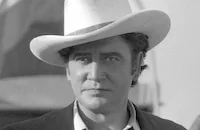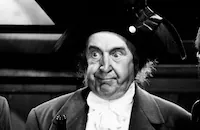Roar of the Dragon

Brief Synopsis
Cast & Crew
Wesley Ruggles
Richard Dix
Gwili Andre
Edward Everett Horton
Arline Judge
Zasu Pitts
Film Details
Technical Specs

Synopsis
From their remote inland hideout, Voronsky and his savage gang of Tartar bandits plan a raid on a Mandarian coast town, where Natascha, a Russian beauty whom Voronsky desires, is hiding. Warned of the bandits' arrival, Chauncey Carson, the alcoholic captain of a commercial steamboat, hurries to ready his boat for departure, pushed by Johnson, his cowardly employer, and other anxious white people who are staying at the town's hotel. There, Carson meets Natascha, a former captive and sexual slave of Voronsky's, who begs him to take her on his boat. Sure that she is a spy, the hard-boiled Carson demands sex from Natascha in exchange for her passage, and she is about to comply when Voronsky's men attack the hotel. Carson, who in a previous encounter with Voronsky had chopped off his ear, hastily sets up a machine gun and turns back the attackers. Although safe inside, the hotel's occupants, who include Helen, a young American entertainer, her admirer Busby, an engineer, and a group of Chinese orphans, discover they are surrounded by the bandits and have a limited supply of food. After Busby and Helen find a goat in a nearby stable and milk it to provide nourishment for the children, Carson catches a Voronsky spy sneaking around the hotel, then notices a group of bandits sawing the hotel's water pipes. Unknown to Carson, another Voronsky spy has sent a message to his boss informing him of Natascha's apparent interest in the captain. Furious at his men's inability to take the hotel, Voronsky sets off for town, while Natascha, who had threatened Johnson with a gun because he wanted to kill the goat for its meat, is accepted by Carson. Just before Voronsky's arrival, Helen is shot and killed by a bandit while passing in front of a window. Then, Sholem, a Jewish butcher, is caught and burned at the stake by Voronsky as he tries to run from the hotel to his shop. By creating a diversion at the hotel's gate, Voronsky is able to penetrate the building and locate Natascha. As Voronsky is leaving with Natascha, however, Carson knocks his gun away and exposes the rest of the bandits to the machine gun, which is manned by a revenge-hungry Busby. Temporarily reprieved, Carson orders the group to flee to the boat while he fights Voronsky. Made brave by his desire for vengeance, Busby remains behind with Carson but is stabbed by Voronsky. Incensed, Carson kills Voronsky, then risks his life to carry the wounded Busby to the boat. Once safely on board, Carson holds a dying Busby in his arms and is comforted by Natascha.

Director

Wesley Ruggles
Cast

Richard Dix

Gwili Andre

Edward Everett Horton

Arline Judge

Zasu Pitts

Dudley Digges

C. Henry Gordon
William Orlamond
Arthur Stone
Will Stanton
James Wang
Crew

Film Details
Technical Specs

Quotes
Trivia
Notes
In an RKO studio memorandum, executive sales manager Ned Depinet complained about David Selznick's insistence that Edward Everett Horton, a free-lance actor, be paid $3,500 per week for his work on this picture. According to Depinet, "Horton is not worth $3,500 per week or anything like that amount. While he is reputed to an excellent actor, he has not five cents worth of box office and for many people, myself among them, he does as much to ruin a picture as to help it." Modern sources add Toshia Mori to the cast. According to modern sources, William LeBaron was to be credited as the film's producer, but the credit was removed as apart of a contract settlement with RKO.












